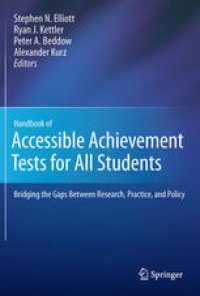
Ebook: Handbook of Accessible Achievement Tests for All Students: Bridging the Gaps Between Research, Practice, and Policy
- Tags: Child and School Psychology, Educational Psychology, Social Work, Teaching and Teacher Education
- Year: 2011
- Publisher: Springer-Verlag New York
- Edition: 1
- Language: English
- pdf
The Handbook of Accessible Achievement Tests for All Students: Bridging the Gaps Between Research, Practice, and Policy presents a wealth of evidence-based solutions designed to move the assessment field beyond “universal” standards and policies toward practices that enhance learning and testing outcomes. Drawing on an extensive research and theoretical base as well as emerging areas of interest, the volume focuses on major policy concerns, instructional considerations, and test design issues, including:
- The IEP team’s role in sound assessment.
- The relationships among opportunity to learn, assessment, and learning outcomes.
- Innovations in computerized testing and the “6D” framework for standard setting.
- Legal issues in the assessment of special populations.
- Guidelines for linguistically accessible assessments.
- Evidence-based methods for making item modifications that increase the validity of inferences from test scores.
- Strategies for writing clearer test items.
- Methods for including student input in assessment design.
- Suggestions for better measurement and tests that are more inclusive.
This Handbook is an essential reference for researchers, practitioners, and graduate students in education and allied disciplines, including child and school psychology, social work, special education, learning and measurement, and education policy.
The Handbook of Accessible Achievement Tests for All Students: Bridging the Gaps Between Research, Practice, and Policy presents a wealth of evidence-based solutions designed to move the assessment field beyond “universal” standards and policies toward practices that enhance learning and testing outcomes. Drawing on an extensive research and theoretical base as well as emerging areas of interest, the volume focuses on major policy concerns, instructional considerations, and test design issues, including:
- The IEP team’s role in sound assessment.
- The relationships among opportunity to learn, assessment, and learning outcomes.
- Innovations in computerized testing and the “6D” framework for standard setting.
- Legal issues in the assessment of special populations.
- Guidelines for linguistically accessible assessments.
- Evidence-based methods for making item modifications that increase the validity of inferences from test scores.
- Strategies for writing clearer test items.
- Methods for including student input in assessment design.
- Suggestions for better measurement and tests that are more inclusive.
This Handbook is an essential reference for researchers, practitioners, and graduate students in education and allied disciplines, including child and school psychology, social work, special education, learning and measurement, and education policy.